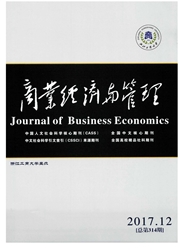

 中文摘要:
中文摘要:
零售企业横向并购,是增强了其市场势力还是提高了其规模效率?对这一问题的不同解读,既会影响我国零售产业政策安排,也会影响我国零售企业发展的战略抉择。基于此,文章利用2005—2011年零售上市企业横向并购的面板数据,运用双向随机效应GMM估计方法,估计了上市公司并购前后的市场势力和规模弹性变化,从而对零售企业横向并购的“效率论”和“市场势力论”假说进行了实证检验,结果表明:在样本观察期内企业通过横向并购规模弹性有一定上升,但市场溢价能力却显著下降了;企业通过横向并购扩张有利于实现协同效应和规模经济,横向并购行为在短期内和长期内都有利于运营现金流收益率的增加。
 英文摘要:
英文摘要:
Does the horizontal merger and acquisitions of retail enterprises reinforces market power or improve the scale efficiency? Different interpretations will not only impact retail industry policy arrangements but also affect the choice of strategies for retail enterprises development. In view of the above questions, the article uses panel data of M&A of retail enterprises in 2005-2011 and GMM estimation method to evaluate the changes of the market power and elasticity of scale of Sample companies. Through the empirical tests Efficiency Theory and Market Power Theory, according to the estimate analysis, it concludes as follows: first, scale elasticity rises after M&A in the observation period, but the market power has decreased significantly. Secondly, it is advantageous for the retail enterprises to obtain coordination effect and scale economics through M&A. Besides, M&A can increase the operating cash flow in the short term and long-term.
 同期刊论文项目
同期刊论文项目
 同项目期刊论文
同项目期刊论文
 期刊信息
期刊信息
